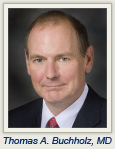“The message” of a meta-analysis of 17 randomized trials of breast-conserving surgery with or without radiation, “should be that the benefits of radiation are not temporary, that it provides an increased chance of cure,” Thomas A. Buchholz, MD, told The ASCO Post. The meta-analysis was conducted by the Early Breast Cancer Trialists’ Collaborative Group (EBCTCG) and published in The Lancet.
“Most people recognize the importance of radiation after breast conservation, and radiation is already established in the National Comprehensive Cancer Network guidelines and other important guidelines,” according to Dr. Buchholz, Head of the Division of Radiation Oncology at The University of Texas MD Anderson Cancer Center in Houston. The EBCTCG meta-analysis could, however, provide more answers for people at high risk of recurrence but who still question the value of receiving radiation upfront, thinking they could “save it” in case they have a recurrence later. “That is the wrong way to think about it,” Dr. Buchholz said, “because if you take that approach, you may compromise your overall survival.”
Omitting Radiation for One Subgroup
Following the initial trials establishing radiation’s benefits among women who had breast-conservation surgery, later trials tried to tease out whether there is a favorable group for whom we can omit radiation, Dr. Buchholz said.
“Omission of radiation was tried in a variety of settings. They tried it by substituting chemotherapy for radiation, and that didn’t work. They tried doing bigger surgeries with bigger margins, and that didn’t work. But eventually there was one study that defined a subgroup of patients—women over the age of 70 with stage I estrogen receptor–positive tumors and negative margins that are also going to be also treated with hormonal therapy. In this setting, radiation still reduces breast recurrence, but the baseline recurrence rate for those without radiation is low enough that it is reasonable to discuss the possibility of not using radiation,” Dr. Buchholz said.
“Of course, some 71-year-olds are in great shape and have a 15-year life expectancy. For them, you might be more apt to use radiation because they are going to have a longer period of their life that is at risk, in contrast to someone who is 85 and has heart disease and diabetes. In such a patient with a life expectancy from these other illnesses of a couple of years, you wouldn’t want to be overly aggressive in using radiation,” Dr. Buchholz added. “So it becomes a judgment call based on competing risks of dying of another disease as well.” ■

 “After breast-conserving surgery,...
“After breast-conserving surgery,...